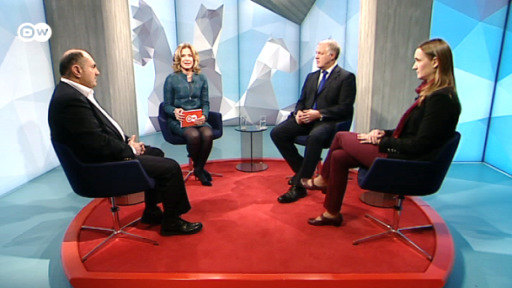Quadriga - Syrian Future - A Role for Assad?

This browser does not support the video element.
In the past the US and other western countries had insisted Assad could play no role in the future of Syria. But Kerry's recent comments could be taken to indicate a cautious change in thinking. Last week Kerry said, "We have to negotiate in the end".
The US government has so far - despite pressure from Republican hawks - rejected a military intervention in Syria. The Obama administration seems to have reached the conclusion that, despite Syria's human rights record, a political solution is not possible without including Assad and his Iranian allies. Syrian human rights organizations estimate there may be as many as 450 thousand people in the regime's prisons. The Syrian opposition, as well as Britain and France, reject the US initiative.
Concerns about further advances of Islamic State in the region seem to have swayed the US to see Assad as the lesser of two evils given the risk that deposing the current regime could create another "failed state" and a new opportunity for IS expansion.
America's most important allies in the region - Israel and Saudi Arabia - are also irritated by the apparent shift in strategy. They worry that the nuclear talks with Iran now entering their final phase could tip the regional balance of power in Teheran's favor.
Kerry's latest comments are seen as breaking a long-held taboo. Will his public suggestion that a solution in Syria is not possible without Assad bring the Syrian dictator back into the bloody struggle for power? And what will this mean for the balance of power in the region?
Syrian Future - A Role for Assad?
Tell us what you think: Quadriga[at]dw.de
Our guests:
Fawaz Tello - is part of Syria's secular opposition movement. He has been living in exile in Germany since 2012. Before that, he was a member of the Damascus Spring Movement. As a result of his political activities he was imprisoned by the Assad regime from 2001 to 2006. He is a founding member of the National Dialog Forum the most powerful liberal grouping, and assisted in establishing the National Council of the Damascus Declaration, the most extended movement inside Syria set up to advocate reform of the Syrian political system. He resigned from the Syrian National Council, criticising its lack of democratic reforms and disunity.
Kristin Helberg- was a freelance correspondent in Syria from 2001 to 2009. She worked for various radio stations such as ARD and ORF, as well as for German newspapers. In 2009 she returned to Germany and lives in Berlin where she works as a freelance journalist. Her main emphasis still focuses on the Middle East. She travels and reports from there regularly.
Andrew B. Denison - isthe director of Transatlantic Networks, a research consortium based in Königswinter, Germany. His main emphasis lies on international and domestic security policy focusing particularly on the Obama administration.